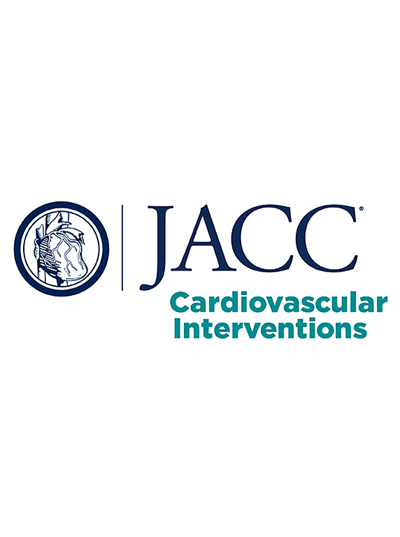Combined Impact of Residual Mitral Regurgitation and Gradient After Mitral Valve Transcatheter Edge-to-Edge Repair
IF 11.7
1区 医学
Q1 CARDIAC & CARDIOVASCULAR SYSTEMS
引用次数: 0
Abstract
Background
Reducing mitral regurgitation (MR) during mitral transcatheter edge-to-edge repair (M-TEER) may come at the cost of increased mitral valve gradient (MVG). The combined impact of residual MR and MVG on clinical outcomes after M-TEER is unknown.
Objectives
This study sought to evaluate the impact of postprocedure MR and MVG on clinical outcomes after M-TEER.
Methods
EXPANDed is a pooled, patient-level cohort of the EXPAND (A Contemporary, Prospective Study Evaluating Real-world Experience of Performance and Safety for the Next Generation of MitraClip Devices) and EXPAND G4 studies, which were designed to evaluate real-world safety and effectiveness of the third- and fourth-generation MitraClip TEER Systems. Subjects were categorized by echocardiographic core laboratory (ECL) assessments into 4 groups according to 30-day MR grade and mean MVG: 1) MR ≤1+/MVG <5 mm Hg; 2) MR ≤1+/MVG ≥5 mm Hg; 3) MR ≥2+/MVG <5 mm Hg; and 4) MR ≥2+/MVG ≥5 mm Hg.
Results
A total of 1,723 subjects had evaluable echocardiograms at 30 days: 72% had MR ≤1+/MVG <5 mm Hg, 18% had MR ≤1+/MVG ≥5 mm Hg, 7% had MR ≥2+/MVG <5 mm Hg, and 3% had MR ≥2+/MVG ≥5 mm Hg. MR≤1+ was sustained through 1 year in 93% of patients who achieved 30-day MR≤1+. MVG decreased from 30 days to 1 year in subjects with MVG ≥5 mm Hg (6.7 ± 4.0 to 5.5 ± 2.5 mm Hg MR ≤1+/MVG ≥5 mm Hg and 6.5 ± 1.5 to 5.5 ± 1.7 mm Hg MR ≥2+/MVG ≥5 mm Hg). One-year rates of all-cause mortality and heart failure hospitalization were lower for subjects who achieved MR ≤1+ at 30 days, regardless of MVG.
Conclusions
Reduction of MR to mild or less after M-TEER with the latest-generation MitraClip systems was associated with clinical benefit regardless of MVG.
二尖瓣经导管边缘到边缘修复术后二尖瓣残余反流和瓣坡的综合影响
背景:在二尖瓣经导管边缘到边缘修补术(M-TEER)中减少二尖瓣反流(MR)可能要以增加二尖瓣瓣膜梯度(MVG)为代价。残余 MR 和 MVG 对 M-TEER 后临床结果的综合影响尚不清楚:本研究旨在评估术后 MR 和 MVG 对 M-TEER 后临床预后的影响:EXPANDed是EXPAND(评估下一代MitraClip设备性能和安全性真实世界经验的当代前瞻性研究)和EXPAND G4研究的汇总患者队列,这两项研究旨在评估第三代和第四代MitraClip TEER系统的真实世界安全性和有效性。根据超声心动图核心实验室(ECL)的评估结果,受试者按30天MR分级和平均MVG分为4组:1)MR≤1+/MVG 结果:共有 1,723 名受试者在 30 天内接受了可评估的超声心动图检查:72% 的受试者 MR ≤1+/MVG:无论MVG如何,使用最新一代MitraClip系统进行M-TEER后将MR降至轻度或轻度以下与临床获益相关。
本文章由计算机程序翻译,如有差异,请以英文原文为准。
求助全文
约1分钟内获得全文
求助全文
来源期刊

JACC. Cardiovascular interventions
CARDIAC & CARDIOVASCULAR SYSTEMS-
CiteScore
11.60
自引率
8.80%
发文量
756
审稿时长
4-8 weeks
期刊介绍:
JACC: Cardiovascular Interventions is a specialist journal launched by the Journal of the American College of Cardiology (JACC). It covers the entire field of interventional cardiovascular medicine, including cardiac, peripheral, and cerebrovascular interventions. The journal publishes studies that will impact the practice of interventional cardiovascular medicine, including clinical trials, experimental studies, and in-depth discussions by respected experts. To enhance visual understanding, the journal is published both in print and electronically, utilizing the latest technologies.
 求助内容:
求助内容: 应助结果提醒方式:
应助结果提醒方式:


